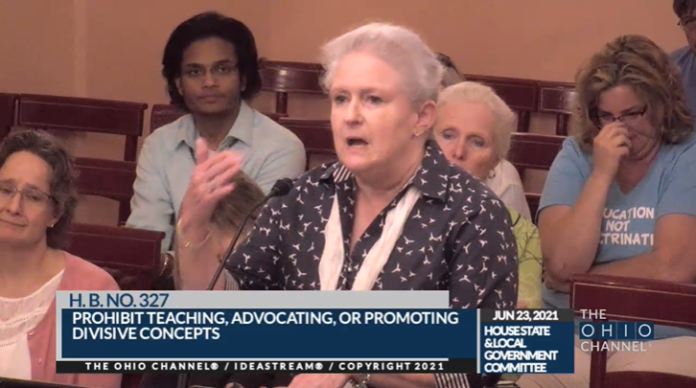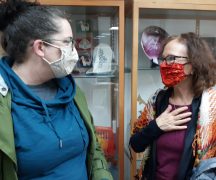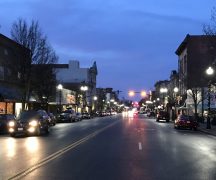By JAN LARSON McLAUGHLIN
BG Independent News
Two Ohio bills aimed at muzzling teachers from talking about “divisive” concepts on race, color, nationality or gender have some local residents speaking out.
As is happening in several states across the nation, the Ohio legislation would target critical race theory, which examines the role race played and still plays in all levels of society, including economics and the law.
The proposed legislation is addressing a problem that doesn’t exist, according to many in education.
Critical race theory is not showing up in K-12 education, and in most cases isn’t addressed until graduate school for some, said Ana Brown, a member of Not In Our Town in Bowling Green.
“They are using critical race theory as a boogeyman,” Brown said. “So we don’t make young white students uncomfortable. By not talking about them, we’re making students of color uncomfortable.”
The issue came up at a recent Not In Our Town meeting in Bowling Green. Dawn Shinew, co-chair of Not In Our Town BG, said both Ohio House Bill 322 and 327 address the teaching of “certain current events” and “prohibit teaching, advocating or promoting divisive concepts.”
But Emily Dunipace, co-chair of Not In Our Town Bowling Green asked “whose interpretation” would be used for determining divisive concepts.
“We know there are efforts here in Ohio to influence what is taught,” Dunipace said.
“It’s a cancer spreading to our democracy,” community member Tom Klein said. “It could be here.”
At last week’s Bowling Green Board of Education meeting, Klein talked about the battle in some states over the teaching of critical race theory. Governors in at least 20 states have or are considering legislation to prevent any teaching about systemic racism.
“It is a theory with a lot of evidence,” Klein said. “Racism is still here.”
As a lifelong educator, Klein said he finds it very troubling that some states want to block history or political science teachers from addressing racism in their classes.
“It is a war right now,” he said. “I’m very, very upset.”
But not everyone shares that concern about teachers being prohibited from teaching about systemic racism.
At previous school board meetings, two other Bowling Green School District residents – Rich Chamberlain and Peggy Thompson – asked the school board about teaching “patriotic” history and not history addressed in the 1619 Project, a New York Times special report on the history and impact of slavery in the U.S.
A new effort called the 1776 Initiative in Wood County supports the teaching of patriotic history in schools.
“One of the last frontiers for the Left are the school districts in the heartland of America,” stated a letter sent out to potential members of the 1776 Initiative. “Topics like critical race theory and LGBTQ+ special interests are actively being deployed at the K-12 level throughout the country.”
The state board of education oversees curriculum models for the state, but it is up to individual school districts to create individualized courses of study.
No Wood County schools are teaching the 1619 curriculum.
Many argue that the true “patriotic” history of a great nation does not insist on focusing just on positives. An honest examination of this nation’s beginnings shows that the founders talked about equality – but many of their actions betrayed that goal.
Dr. Andy Schocket, who teaches history focusing on the American Revolution period at Bowling Green State University, said history is often viewed through multiple lenses. Some see it as open to continual reinterpretations as time changes. Others see history such as the founding of the U.S. as “this glorious, possibly divinely inspired event.”
“I always think it’s great when people are interested in history,” he said. “But I also am disturbed by an interest that appears to be a desire to push a position.” That desire can ignore the complex history of the U.S. and result in patriotism morphing into nationalism, he said.
As for the 1619 Project being on the list of resources for Ohio educators, Schocket said the information offers defensible historical interpretations from history scholars.
“I don’t find that objectionable,” he said.
House Bill 327 and its supporters say historical topics such as the Constitution and the Civil War should be taught in a neutral way that presents both sides, rather than through a lens that pits one race or group against another, possibly causing feelings of “white guilt.”
According to the state education department, Ohio has received very few complaints about the academic critical race theory being taught in schools, though supporters of the bill said they’ve heard complaints from teachers and parents in individual districts.
According to the American Bar Association, critical race theory is not a diversity and inclusion “training” but a practice of interrogating the role of race and racism in society. The theory recognizes that racism is not a bygone relic of the past. Instead, it acknowledges that the legacy of slavery, segregation, and the imposition of second-class citizenship on Black Americans and other people of color continue to permeate the social fabric of this nation.
Leaders of legislative efforts against the practice claim it pits different races against one another and creates “discomfort” for white students.
HB 327 applies to school districts and state agencies and specifies that it includes state colleges. It would ban teaching such concepts as “the United States is fundamentally racist or sexist” and “an individual, by virtue of the individual’s nationality, color, ethnicity, race, or sex, bears responsibility for actions committed in the past by other members of the same nationality, color, ethnicity, race or sex.”
HB 327 threatens to cut funding for school districts that violate the prohibitions listed.
The bill also bans state agencies from offering instruction or training on divisive concepts – such as diversity training – to any employees, contractors, staff members, or any other individual or group or require them to adopt or believe in divisive concepts.
HB 322 applies to schools and state agencies but does not specify if that would include colleges. It would outlaw teaching such concepts as “fault, blame, or bias assigned to a race or sex” and “the advent of slavery in the territory that is now the United States constituted the true founding of the United States.”
The Ohio Federation of Teachers said the bills “were written to address a non-existent problem” and to dissuade teachers from covering important topics.
Some have questioned how the proposed state legislation would affect the teaching of subjects like the Holocaust – which may create “feelings of discomfort.”





